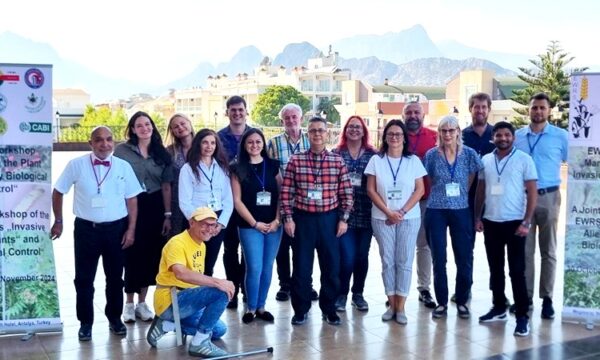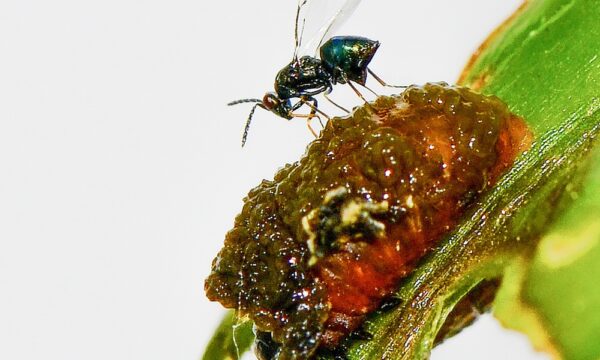
Drosophila suzukii on cherry. Photo credit: Tim Haye
CABI scientist Dr Lukas Seehausen has updated delegates at the International Soft Fruit Conference in s-Hertogenbosch, in the Netherlands, on the very latest research in the fight against the devasting fruit fly Drosophila suzukii.
Dr Seehausen, a research scientist in risk analysis and invasion ecology based at CABI’s Swiss centre in Delémont, said a biological control agent – the parasitoid Ganaspis cf. brasiliensis – could soon be released to manage the invasive pest in Europe.
Since 2008, this Asian fruit fly has invaded several continents and has become a very serious phytosanitary risk and challenge to fruit production attacking over 150 wild and cultivated fruits, including cherries, blueberries and strawberries, as well as the fruits of ornamental plants.
Dr Seehausen and other colleagues from CABI, including Dr Marc Kenis, Dr Tim Haye and former PhD student Pierre Girod, have been investigating options for classical biological control of Drosophila suzukii as part of a project that includes scientists from INRA – the French National Institute for Agricultural Research – and Yunnan Agricultural University, China.
The study, funded by Dropsa, the Federal Office for the Environment, Switzerland, Loterie Romande, Switzerland and the Federal Office for Agriculture, Switzerland, has been collecting possible parasitoids from China and Japan for analysis at CABI’s laboratories in Switzerland.
The research involved learning more of their biology and ecology, including their life cycle, substrate preference (fresh fruits, artificial diet, decaying fruits) and host specificity, ensuring the possible biological control agents would not negatively impact local species.
Dr Seehausen said, “New and emerging pests such as Drosophila suzukii can have a devastating impact on global food security so it is important we develop targeted pest management strategies to minimise the impact on fruit production in the EU region.
“Our research has shown that Ganaspis cf. brasiliensis is the most promising candidate for introduction in Europe as a biological control agent because it is the most specific parasitoid and and inflicts high mortality in D. suzukii.
“Furthermore, it is able to parasitize D. suzukii larvae feeding in different fruits such as apricot, blackberry, blueberry, cherry, raspberry, and strawberry, meaning it could be a viable biological control agent in a wide variety of crops.”
Dr Seehausen said further research is currently being carried out, including cross-mating experiments with different populations of the parasitoid and further molecular studies to sort out the taxonomic status of Ganaspis cf. brasiliensis before it can be released to combat D. suzukii in Europe.
Dr Seehausen added, “But we first need to resolve issues including its taxonomic status of the parasitoid before recommending it for release.”
Dr Seehausen’s presentation to the ISFC ‘Progress in Research on the Use of Asian Parasitoids Against Drosophila suzukii’ can be viewed from the SCRIB platform.
Further information
- CABI project: Biological control of the Spotted wing Drosophila – Drosophila suzukii
- The parasitoid complex of D. sukukii and other fruit feeding Drosophila species in Asia, Scientific Reports
- Development of Asian parasitoids in larvae of Drosophila suzukii feeding on blueberry and artificial diet, Journal of Applied Entomology
- Host specificity of Asian parasitoids for potential classical biological control of Drosophila suzukii, Journal of Pest Science
- Non-crop plants used as hosts by Drosophila suzukii in Europe, Journal of Pest Science
- Current SWD IPM tactics and their practical implementation in fruit crops across different regions around the world, Journal of Pest Science
Related News & Blogs
Biological control in action: Zambia’s field days on fighting fall armyworm
Experts from CABI recently held two field days and an expo in Zambia, showcasing innovative approaches to pest management to 584 farmers, agro-dealers and other stakeholders to help raise awareness of approaches to tackle the invasive fall armyworm (Sp…
11 June 2025




